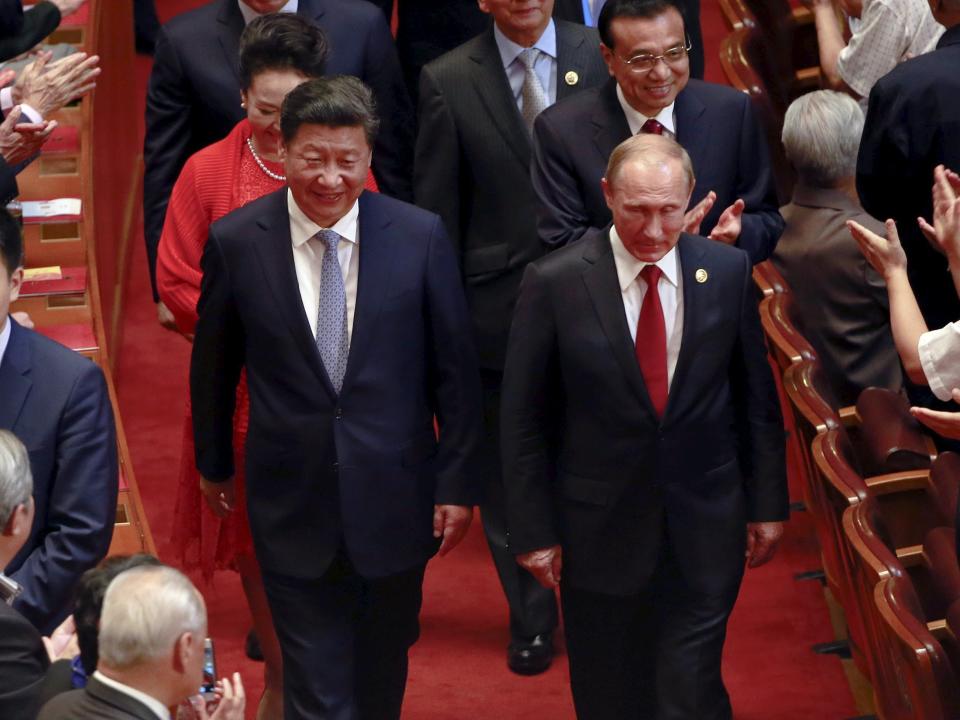China and Russia are boosting their military cooperation to try to contain the US

China and Russia will increase military exercises to strengthen security and defence cooperation amid growing tensions in the disputed South China Sea.
Russian Defence Minister Sergey Shoigu unveiled the plan at a meeting with his visiting Chinese counterpart Chang Wanquan on Wednesday, Tass news agency reported.
“We highly appreciate a high level of Russian-Chinese contact both at the state and defence levels,” Shoigu said. “This year we are going to hold more exercises and events than in past years.”
Speaking on the sidelines of an international security conference in Moscow, Shoigu said the two nations would conduct both ground and naval exercises.
“Certainly, the aim is to strengthen mutually beneficial relations of partnership,” he said.
China was willing to deepen defence and security ties with Russia and to maintain “communication and coordination over regional and international hot-button issues”, including anti-terrorism, Xinhua quoted Chang as saying.
Both countries “faced a more complicated situation in the sphere of international security”, which required them “to pull together and join efforts”, he said.
Shoigu was cited by Xinhua as saying the deepening comprehensive strategic partnership between Beijing and Moscow would help “safeguard peace and stability of the Eurasian region and the world.”
The remarks come as Beijing steps up efforts to lobby support ahead of a key international court ruling on the South China Sea disputes, which is widely expected to go against China.
Last week, Foreign Minister Wang Yi told his Russian counterpart Sergey Lavrov that both nations should join hands to oppose “internationalizing” the disputes, referring to the ruling from the Permanent Court of Arbitration in The Hague due in late May or early June.
China and Russia have intensified military exercises over the past year, including several naval exercises conducted last year. China will host the Joint Sea-2016 naval drill later this year.
The strengthened defence ties between the two nations, mainly through the Shanghai Cooperation Organisation platform, are widely believed to be aimed at countering the United States’ growing military presence in the Asia-Pacific region.

Reuters/Kim Kyung Hoon
Professor He Qisong, of the Shanghai University of Political Science and Law, said deep mistrust remained between Beijing and Moscow because of their conflicting interests. The so-called trust and cooperation between the two powers was largely aimed at Washington, he said.
Analysts noted that just a day before meeting Chang, Shoigu also pledged to expand military ties with the Association of Southeast Asian Nations. Four Asean nations have rival claims to territory in the South China Sea.
Meanwhile, in a speech at the Moscow security conference, Chang highlighted the importance of deepening international cooperation in the global fight against terrorism, which posed daunting challenges to China, Xinhua reported.
“To fight against terrorism, a comprehensive approach should be taken through political, diplomatic, economic and cultural means in order to eliminate the root of terror,” he said.
Chang also lashed out at double standards and ideological bias in the global anti-terror efforts – an apparent reference to Beijing’s displeasure with the US-led coalition that has refused to back its crackdown on Uygur militants or Islamic State-linked fighters in Xinjiang.
Chang hailed China’s “One Belt, One Road” initiative – an economic strategy aimed at advancing the country’s diplomatic and security interests – as an effective way to promote peace and stability throughout the region.
(Additional reporting by Minnie Chan.)
NOW WATCH: The longest study on happiness revealed that people who did this lived longer, happier lives
See Also:

 Yahoo Finance
Yahoo Finance 
